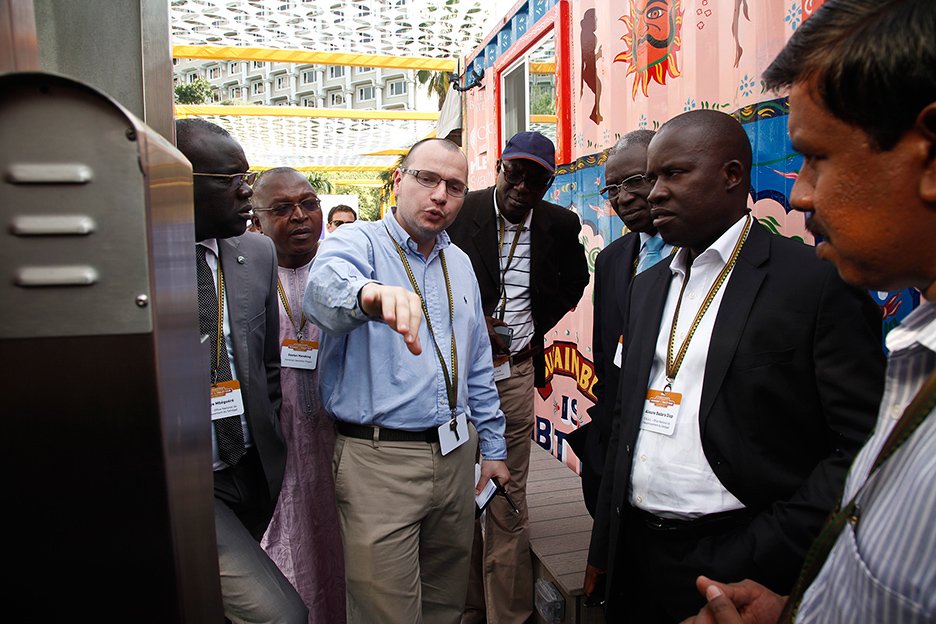Indian researchers to develop next generation toilets
March 24, 2014 | Monday | News | By Rahul Koul Koul
Indian Researchers Selected to Develop Next Generation Toilets
Eram Scientific Solutions (left) and California Institute of Technology (right)are two of the 49 exhibitors at 'Reinvent the Toilet Fair: India'. Eram's self-cleaning communal toilet prototype features automatic sterilization after each use and inco
Six Indian innovators have been selected to contribute to the development of sanitation solutions as part of the Reinvent the Toilet Challenge: India. From a pool of 108 applications, these projects were chosen following an extensive, rigorous selection process by an expert committee.
The "Reinvent the Toilet Challenge: India" is a collaborative effort of the Department of Biotechnology (DBT), Ministry of Science and Technology, Government of India; Biotechnology Industry Research Assistance Council (BIRAC), A Government of India Enterprise; and the Bill & Melinda Gates Foundation to fund Indian researchers to develop innovative, safe and affordable sanitation technologies. This program is an India-specific program modeled on the Gates Foundation's global Reinvent the Toilet Challenge. The DBT and the Gates Foundation invested a combined US$2 million, equally split, to support Indian investigators to drive research, development, and production of "next-generation toilets."
The grants were announced on March 22, 2014 by Prof. K VijayRaghavan, Secretary DBT & Chairman, BIRAC at the "Reinvent the Toilet Fair: India", an event held in New Delhi that showcased innovative products and approaches that aim to bring safe, affordable and sustainable sanitation to those who need it most.
Co-hosted by the DBT and the Gates Foundation, the fair included more than 45 exhibitors representing 15 nations and featured projects to stimulate discussion among a diverse group of stakeholders working to improve global sanitation. These include efforts to create toilets that are not connected to water, sewer or electricity; improve the collection, treatment and disposal of human waste; address behavior change; and raise awareness of this critical issue for governments, stakeholders and local communities.
"Effective and comprehensive sanitation seems an impossible dream for India," said Professor K VijayRaghavan. "Yet today we see a congruence of new and applicable science and technology, its affordability, and sustainable implementation. This congruence is a great opportunity which we cannot afford to let slip. By implementing effective solutions in each kind of social context, big problems can be dealt with in small units and be catalysts for scaling up. By working together to hit big barriers at the right place and the right way, they can crumble and the impossible can become real."
The details of the grant recipients for the "Reinvent the Toilet Challenge: India" are as follows:
1. Eram Scientific Solutions, Kerela in collaboration with University of South Florida: A field trial grant to test off-grid, self-sustained, modular, electronic toilet for houses and communities with solar energy for Indian weather, integrated with mixed waste processing unit. The project will couple a modern, public toilet with an advanced onsite, biological treatment system. It will be housed in a standalone unit that will be initially field tested in a suburban slum.
2. Amrita School of Biotechnology, Kerela: A proof of concept grants to use viral agents to target and kill pathogens and odour-producing bacteria in fecal waste and also develop for a way to integrate this into waste treatment systems. This is a proof of concept grant.
3. Pradin Technologies, Bangalore: The project will test the concept of using ultra-sound to reduce water use in a toilet. It will also test the ability to enhance the settling of fecal particles in a storage tank using ultra-sound. This is a proof of concept grant.
4. Indian Institute of Technology Roorkee in collaboration with Fresh rooms Life Sciences: The project will develop a single household container that will cultivate Black Soldier Fly larvae, using human faeces, which can be processed into valuable products. The project will also demonstrate the market potential for these products. This is a proof of concept grant.
5. Institute of Chemical Technology, Mumbai: The project will evaluate the concept of using fine sand-like material and an air blower to create a water-free toilet interface that is free from odour and flies.
6. BITS PILANI K. K. Birla Goa Campus in collaboration with Ghent University and Sustainable Biosolutions LLP: The project will demonstrate a novel septic tank design that integrates electrochemistry to reduce organic pollutants and improve the quality of effluent discharged. The system will be demonstrated at a single household and society/gated community. This is a proof of concept grant.
The Reinvent the Toilet Fair: India hosted approximately 700 attendees-exhibiting teams represented 15 nations and general participants represented 42 nations.









